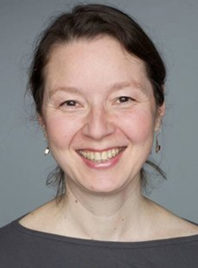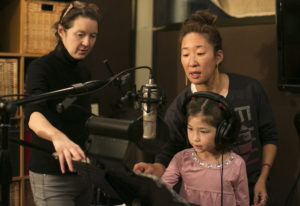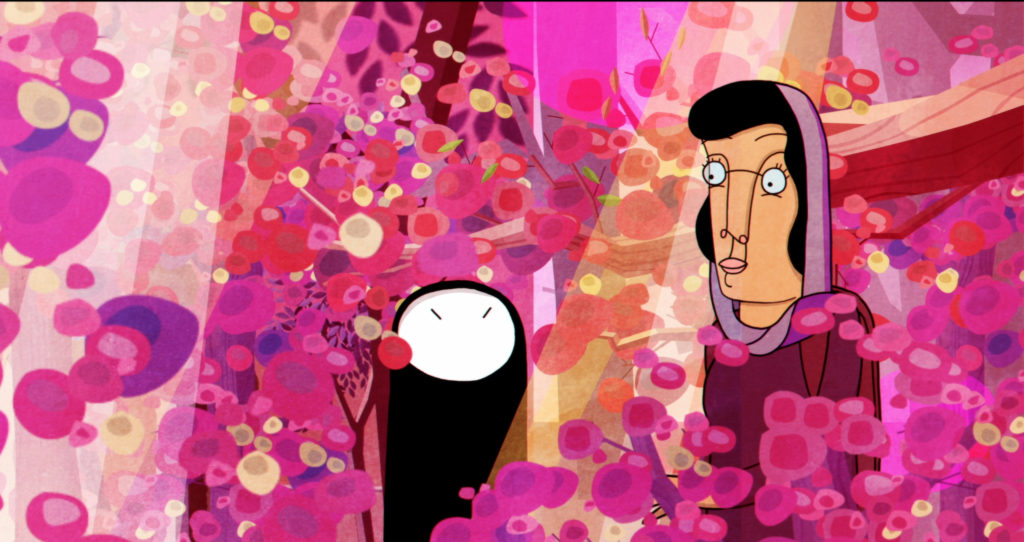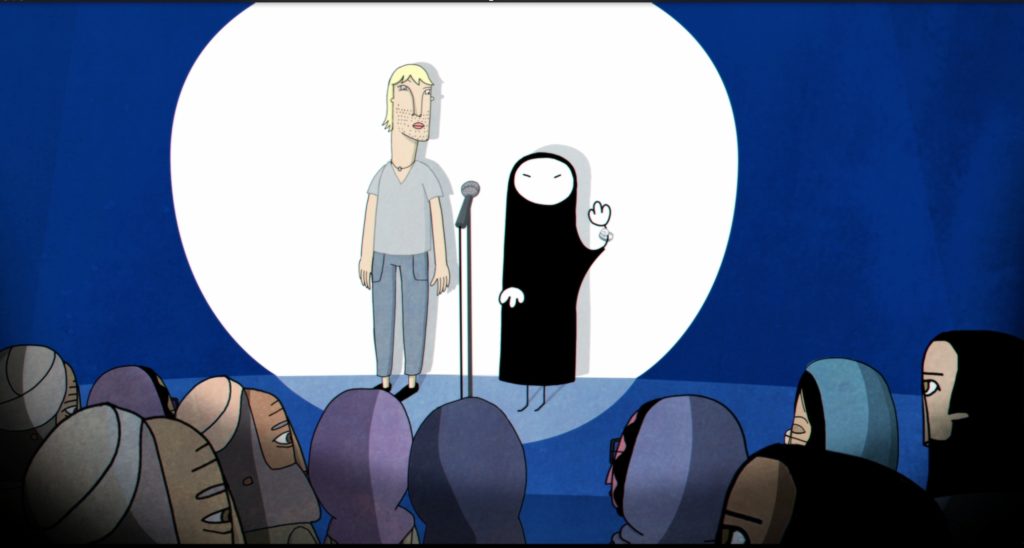
I know it sounds kind of clichéd, but every once in a while, you come across a movie that simply takes your breath away as it reminds you of the pure magic and the power of telling a story, Window Horses: The Poetic Persian Epiphany of Rosie Ming is that kind of movie.
After being named Film of the Year by the Canadian Online Film Critics Association in 2016 and touring the festival circuit across the globe it is coming home to roost for its Canadian theatrical run here in Toronto and Vancouver before rolling out across the country.
Window Horses is a lush and hand drawn animated film that tells the story of Twenty-year-old poet Rosie Ming (voiced by Sandra Oh) who lives at home with her over-protective Chinese grandparents, never having travelled anywhere alone. When she’s invited to perform at a poetry festival in Shiraz, Iran, she meets colourful poets and Persians, and finally learns more about the Iranian father who she had assumed abandoned her. Rosie embarks on an unwitting journey of forgiveness, reconciliation, and understanding, as she discovers her father’s past and her own cultural identity.
In advance of today’s opening I got the unique opportunity to sit down and talk with director Ann Marie Fleming about this labour of love and the effect that it has had on her as a filmmaker and with audiences across the world.
Dave Voigt: I truly loved this story as it was something that brings the importance of creativity and art to the forefront filled with characters that are both self-assured but also looking for their way in the world like young Rosie. Talk to me a little about the style of the film because while the narrative is quite clear we get such a stylistic mix of not only prose but also of music and visual styles. Was the hand drawn nature of the animation always the plan going into this project to allow the film to create the very fluid style that we see or were there other iterations of how the film was going to look?
Ann Marie Fleming: Yes, in some ways, this is a film about the creative process and the nature of art making. Rosie is on this journey of discovery and all the other characters are very patient and generous with her, partly because they see themselves as on the same journey, just at a different stage of it. As a stick girl, Rosie can be naive, ask the dumb questions, make mistakes, and nobody judges her.
The film was always meant to be artisanal. It was just going to be me and Kevin Langdale (the main designer and animator). Rosie was always going to be a stick girl- my avatar, who I have been working with for nearly 30 years- . As it grew and evolved, I wanted different artists to create the visuals for the poems and histories. This is a point of view film. I wanted to show the work of different artists to represent how Rosie’s imagination expands and changes as she has more information, more experiences.
DV: The film manages to be a very cultural experience without hitting us over the head with any social or political motifs. Was making Rosie into a race neutral stick figure character always by design from the beginning of you working on this story? I really loved how she seemed to be a bridge to bring all the cultures together at the poetry festival and make it all about the mutual connection we all have to the arts.
AMF: As I said, stick girl was always going to be the central character. I created her back when I was an art student and was hit and run over by a couple of cars. She represented all the strength I had in my body at the time, and has always been my more fearless self. This is the first time she has had a name- Rosie Ming, and has had someone else voicing her- the amazing Sandra Oh. She has always been part Chinese, because I am, and I made her half Persian so that I could really imbed myself in this story and take the journey with her. She really is a bridge to many cultures and to the arts! Thank you for saying that! She would love to hear it!
DV: The voice casting was quite good, even down to Don McKellar and his German accent, how long did it take for you to get everyone you wanted for the film?
AMF: I think of animators as really slow actors. The actors are everything. The voice casting, like the film, both took a long time to find the right flavours and also came together quite quickly and serendipitously. Once Sandra came on board to help with the film, her involvement made it possible to attract a lot of the cast to come on  board. I had been thinking of Shohreh Agdashloo when I was writing mehrnaz. Nancy Kwan, it turned out, is a very old friend of the family! Don McKellar stood in to do a scene with Shohreh and Sandra (Sandra insisted we do all of the recordings as actual scene work, not with actors alone in a studio), and he had been spending some time in Shanghai with a German director and was channeling him, it sounded like, so we convinced him to be in the film. His real-life friendship with Sandra I think adds a lot to Rosie and Dietmar’s on-screen relationship.
board. I had been thinking of Shohreh Agdashloo when I was writing mehrnaz. Nancy Kwan, it turned out, is a very old friend of the family! Don McKellar stood in to do a scene with Shohreh and Sandra (Sandra insisted we do all of the recordings as actual scene work, not with actors alone in a studio), and he had been spending some time in Shanghai with a German director and was channeling him, it sounded like, so we convinced him to be in the film. His real-life friendship with Sandra I think adds a lot to Rosie and Dietmar’s on-screen relationship.
DV: Rosie’s emotional journey is such a universally relatable one, especially for anyone in the creative fields. Do you think; especially in the realm of filmmaking that it is too easy to lose what I guess you would call an ‘emotional understanding’ of the material at hand when the words on the page have to take on a more unique life of their own?
AMF: I am not sure if this is answering your question but… filmmaking is really hard. There are so many people, processes and tech to go through from idea to completion, and with animation it seems harder. How to keep the spontaneity and original soul of your project alive? How can so many creative and non-creative elements come together, twist and turn so many times and still hold the same emotional resonance? How do you show a language to different audiences in different media? A poem seems easy and direct enough. An idea. Written word. Performance. A film can be like that. It just may take a few years.
DV: Obviously it would have been impossible to predict the current political landscape that we live in when you started this project, but the themes of understanding across art forms and social structures is undeniable throughout the film. How have the reactions been to you while you have been touring the film on the festival circuit across the globe?
AMF: I wanted to make this film to add a positive contribution to understanding between cultures, and to put forth the healing power of art, and how we are really more the same than we are different. Easy to say! I set it in Iran for many reasons… one of them, because of the similarity between Chinese and Persian culture… both so ancient, so focused on family, and whose poets from a millennia or more ago are still revered and relevant in contemporary society… but also to present a balance to some of the negative tropes out there. I have shown this film all over the world, often with subtitles, which is another layer to the efforts that we go in trying to understand each other. The reactions have all been the same. People laugh in the same spots, cry in the same spots, and have the same questions and answers. We have the same discussions about art. And everyone notices how kind the characters are to one another. Everyone thinks Dietmar is funny. The film is really about compassion.
DV: Ultimately this film really does feel like a call on the artistic community across all mediums to not forget or abandon those things that inspire us. Now obviously the balance between art and commerce is always a difficult one, but the passion of this story allows it to resonate on so many levels that the film keeps a certain level of balance. What do you have to say to artists out there who struggle with the differences between commercial success and staying true to their visions?
AMF: Ah, this is a tricky one. Call me naive, but after nearly 30 years of making work, I still think that I should be able to make a living off of making my art. That, because I am a human being, other human beings may be interested in what I have to show them, and some of them may even want to pay me for that. This is my most mission-y film I have ever made- And also, perhaps, one of my most personal. I really think we need some positive images out there about how we can be. We really need to be open to the voices of others. Ironically, because Sandra Oh came on board, and because of the other people who helped make this film, it has had more support than anything I’ve ever made, and it is getting more attention, too. While it is still a very low- budget film, it has a chance out there, to get heard. Maybe even make some money. Stay true to what you believe in. If it is important to you, it will mean something to others, too. I wanted to make a film about poetry where a stick girl goes to Iran. It took me QUITE A FEW YEARS to get this funded. I finally started it on my own, and did a crowd-funding campaign on Indiegogo. Yes, I had a long relationship with Sandra, but she became so involved because she loved what I was trying to do. You can’t chase commercial. Just do what you do. And do what is easy. What is essential to your core is always the easiest path.
DV: For any Rosie Ming’s out there on the brink of their own creative epiphanies, what do you hope that the film will say to them?
AMF: Stay open and curious. Things sometimes take longer than you think, but then you can see how everything is round, and you can see the circle come together. It’s so exciting!
Window Horses is open now in Toronto and Vancouver and rolling out across the country this summer and it is truly a landmark and necessary piece of Canadian filmmaking.



